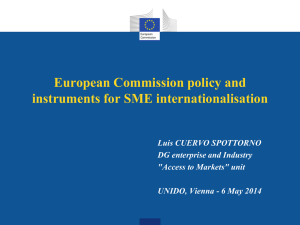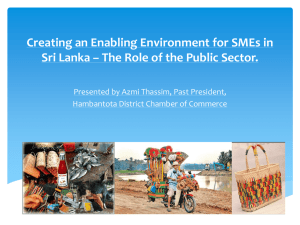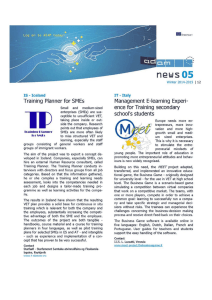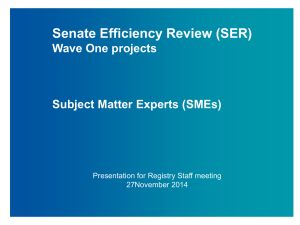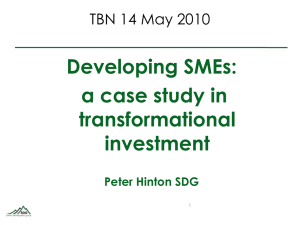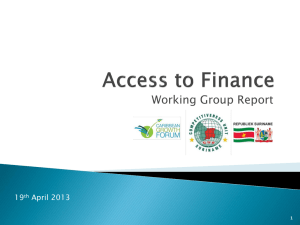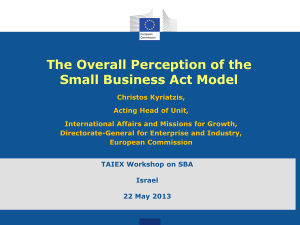view - Smecda
advertisement
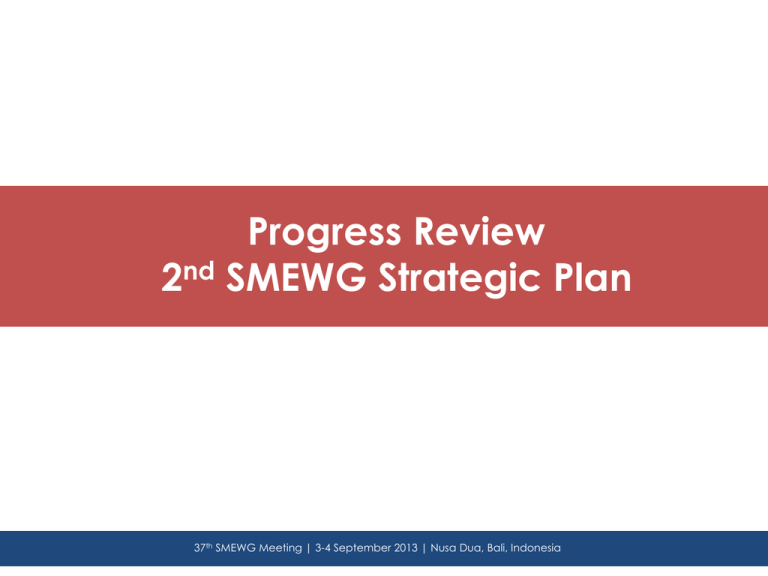
Progress Review 2nd SMEWG Strategic Plan 37th SMEWG Meeting | 3-4 September 2013 | Nusa Dua, Bali, Indonesia Overview 1. By the Numbers 2. Summary of 2013 and 2014 Project Status and Deliverables 3. Summary of 2013 and 2014 KPIs 4. Emerging Issues and Potential Collaboration 5. SCE Comments on 2013-2016 Work Plan By the Numbers 18 Projects covering all Strategic Plan priorities and objectives completed, being implemented or endorsed in 2013-2014 18 Workshops, seminars and trainings held by APEC Economies in 2013-2014 period. 9 26 Reports, papers, databases and other deliverables being made available to APEC economies in 2013-2014. KPIs that are being met by current projects (out of 36) Summary of 2013 and 2014 Project Status and Deliverables Priority Area Objectives Relevant SMEWG Funded Projects Main Progress/Achievement Deliverable (if any) PRIORITY AREA 1: Building Management Capability, Entrepreneurship, and Innovation Encourage entrepreneurship and business start-ups, and provide capacity building activities for SMEs and MEs Promote Innovation as a Key Competitive Advantage for SMEs and MEs Mentoring sessions and capacities building activities delivered by seniorlevel executives and government officials for 30 start ups APEC Startup Accelerator Initiative – Startup Leadership Summit 2013 (Project SME 01 2013) – Chinese Taipei Startup Accelerator and Leadership Summit were held in Taipei, Chinese Taipei, in August 2013 Seminar on the Dynamics of SME: Informality and Women Entrepreneurship (S SME 06 12A) - Indonesia Workshop will be held in September 2013 Government official will be trained to develop policies that facilitates capacity building in SMEs the development of women entrepreneurs. International Symposium and Workshop - Enhancing the Competitiveness of SMEs through the Innovative Cooperative Business Model (SME 03 12) – Peru Workshop will be held in November 2013 Guidelines paper on Promoting SME Competitiveness through the CBM and associative business schemes. Promoting Innovation Seminar: How Smart IPR Policies Can Encourage SMMEs’ Research and Development (SME 04 2013A) - Thailand Not yet started; Thailand is receiving proposals. Seminar will be held in Bangkok in October 2014 Suppliers of venture capital/angel capital fund was connected with SMEs in the fund raising event Summary of 2013 and 2014 Project Status and Deliverables Priority Area Objectives Relevant SMEWG Funded Projects Main Progress/Achievement Deliverable PRIORITY AREA 1: Building Management Capability, Entrepreneurship, and Innovation Empower SMEs and MEs to Recognize Green Issues, and Foster Sustainable Growth and Energy Efficiency APEC Carbon Labeling Workshop (Project SME 07 2012A) – Korea Workshop was held in Makati City, the Philippines, in March 2013 Establishing Green Technology Innovation Network to Support SME Development (S SME 04 12A) - Indonesia Two workshops were held in Bali, Indonesia in March and May 2013 Improve Natural Disaster Resilience and Ensure Business Continuity of SMEs and MEs Improving Natural Disaster Resilience of APEC SMEs to Facilitate Trade and Investment (M SCE 02 2011A) – Chinese Taipei The first workshop was held in Makati City, the Philippines, in March 2013. The second train-the-trainer workshop was held in Chinese Taipei in August 2013. Report on the benefits and challenges of the carbon labeling scheme and experience and best practices of the scheme will be uploaded on the APEC SME Innovation Center website and distributed to SMEWG members. Establishment of a technology network between green technology-based SMES and the technology innovation providers Guideline Document on Promoting SME Business Continuity Plans to Strengthen Reliability of Supply Chains BCP Survey Summary of 2013 and 2014 Project Status and Deliverables Priority Area Objectives Relevant SMEWG Funded Projects Main Progress/Achievement Deliverable PRIORITY AREA 2: Finance Increase awareness and availability of wide-ranging sources of financing, from microfinance to venture capital Strengthen SMEs’ Access to Finance Financing APEC SME Innovation Workshop: Identifying Government Policies that Promote Venture Capital Investment in APEC Economies (SME 03 2013A) Thailand Not yet started; Thailand is receiving proposals. Workshop will be held in Bangkok in March 2014. Start-Up APEC Conference II 2012: Business to Global Market (SME 05 12) - Peru Workshop will be held in September 2013 APEC SME Trade Finance Conference (SME 02 2012) – United States Workshop will be held in November 2013 Report on strategies to promote business angels networking and venture capital and enhance understanding of the business ecosystem will be published on APEC website A set of recommended actions for APEC economies to take to improve their SME trade finance structure Summary of 2013 and 2014 Project Status and Deliverables Priority Area Objectives Relevant SMEWG Funded Projects Main Progress/Achievement Deliverable PRIORITY AREA 3: Business Environment, Market Access and Internationalization Establish Open and Transparent Business Environments for SMEs and MEs Enhance SMEs’ and MEs’ Capacity to Internationalize, and Assist SMEs and MEs Identify Foreign Business Opportunities Business Ethics Capacity Building for SMEs in the Medical Devices, Construction and BioPharmaceutical Sectors (M SCE 01 2011A) – United States Directory of Initiatives Used by APEC Economies to Assist SMEs’ Access to Global Markets (Directory of Initiatives to Support SME Exporters) (Project SME 02 2013) – Australia A training-of-trainers for ethics compliance trainers was held in Kuala Lumpur in August 2013. Research and Assessment of Prospects for Development of an Integrated Information Tool to Stimulate Involvement of SMEs of the Asian-Pacific Region into the Global Trade System, Global Production and Supply Chains - Russia Not yet started; Russia is obtaining finance for part of the project. A stakeholder awareness for the healthcare sector workshop will be held in Bali, Indonesia in September 2013. Australia is preparing RFP; economies will be invited to complete information template for each initiative they wish to include in the directory. 100 Ethics compliance trainers from APEC economies were trained and will implement ethics workshops for their association members in the next 12 months. The directory will come out by the end of 2013 and will provide an easily accessible resource for policy development by sharing information on initiatives that can be new and innovative or considered best practices based on proven outcomes. Summary of 2013 and 2014 KPIs Priority Area Objectives Relevant SMEWG Funded Projects Areas for further development KPIs Met PRIORITY AREA 1: Building Management Capability, Entrepreneurship, and Innovation Encourage entrepreneurship and business start-ups, and provide capacity building activities for SMEs and MEs APEC Startup Accelerator Initiative – Startup Leadership Summit 2013 (Project SME 01 2013) – Chinese Taipei Promote Innovation as a Key Competitive Advantage for SMEs and MEs International Symposium and Workshop - Enhancing the Competitiveness of SMEs through the Innovative Cooperative Business Model (SME 03 12) – Peru Seminar on the Dynamics of SME: Informality and Women Entrepreneurship (S SME 06 12A) - Indonesia Promoting Innovation Seminar: How Smart IPR Policies Can Encourage SMMEs’ Research and Development (SME 04 2013A) - Thailand • • • • • • • • • Provide Access to management information and guidance Provide access to business startup information and guidance Implement programs to promote entrepreneurship to youth, women and minorities Share information on new business models • Strengthen the capability of business development service providers Improve SME R&D Performance Foster Innovative SMEs Encourage Commercialization of IPR Promote Exporting of IP Promote industry-academia collaborations • Encourage SMEs’ expenditure on R&D education Encourage collaborative research among APEC economies More public-private dialogues on IPR Encourage the use of ICT and ecommerce platforms to promote and facilitate the internationalization of SMEs • • • Summary of 2013 and 2014 KPIs Priority Area Objectives Relevant SMEWG Funded Projects Areas for further development KPIs Met PRIORITY AREA 1: Building Management Capability, Entrepreneurship, and Innovation Empower SMEs and MEs to Recognize Green Issues, and Foster Sustainable Growth and Energy Efficiency APEC Carbon Labeling Workshop (Project SME 07 2012A) – Korea • Establishing Green Technology Innovation Network to Support SME Development (S SME 04 12A) - Indonesia • Improve Natural Disaster Resilience and Ensure Business Continuity of SMEs and MEs Improving Natural Disaster Resilience of APEC SMEs to Facilitate Trade and Investment (M SCE 02 2011A) – Chinese Taipei • • • • Strengthen understanding and capability of SMEs to foster sustainable and innovative growth Provide access to green related info. and guidance Implement programs to promote sustainable growth and energy inefficiency • Strengthen understanding and capability of SMEs and MEs facing natural disasters Provide access to related information and guidance for SMEs and MEs to ensure business continuity Implement programs to enhance natural disaster resilience of SMEs and MEs • Capacity building programs should be implemented on a continual basis More follow-up capacity building programs to train SMEs and set up guidelines and best practice in this area Summary of 2013 and 2014 KPIs Priority Area Objectives Relevant SMEWG Funded Projects Areas for further development KPIs Met PRIORITY AREA 2: Finance Increase awareness and availability of wide-ranging sources of financing, from microfinance to venture capital Financing APEC SME Innovation Workshop: Identifying Government Policies that Promote Venture Capital Investment in APEC Economies (SME 03 2013A) Thailand • • • Increase availability of different forms of public / institutional financing Increase awareness of different forms of financing to SMEs and MEs Increase availability of private financing • Other forms of financing not covered above Increase availability of technical assistance funds, such as credit guarantee, to facilitate access to credit Improve access to financing assistance for SMEs and MEs Develop information systems for monitoring the provision of financial information • Encourage the flow of private sector as well as other financial activities that support SMEs. Start-Up APEC Conference II 2012: Business to Global Market (SME 05 12) - Peru Strengthen SMEs’ Access to Finance APEC SME Trade Finance Conference (SME 02 2012) – United States • • Summary of 2013 and 2014 KPIs Priority Area Objectives Relevant SMEWG Funded Projects Areas for further development KPIs Met PRIORITY AREA 3: Business Environment, Market Access and Internationalization Establish Open and Transparent Business Environments for SMEs and MEs Enhance SMEs’ and MEs’ Capacity to Internationalize, and Assist SMEs and MEs Identify Foreign Business Opportunities Business Ethics Capacity Building for SMEs in the Medical Devices, Construction and BioPharmaceutical Sectors (M SCE 01 2011A) – United States Directory of Initiatives Used by APEC Economies to Assist SMEs’ Access to Global Markets (Directory of Initiatives to Support SME Exporters) (Project SME 02 2013) – Australia Research and Assessment of Prospects for Development of an Integrated Information Tool to Stimulate Involvement of SMEs of the Asian-Pacific Region into the Global Trade System, Global Production and Supply Chains - Russia None (but no KPIs exist that cover business ethics/transparency) • • • • • • • • • Increase information on market access and opportunities Increase availability of information on trade and investment Implement measures/programs to identify and address trade barriers facing SMEs and MEs Build SME capabilities to market products and services internationally Deliver strategies to facilitate SMEs participation in international business Streamline registration of business Establish favorable regulatory environment for SMEs Promote industrial linkages between SMEs and large firms Promote government procurement opportunities for SMEs • There is need for ongoing efforts to follow up these useful exercises • More information exchange platforms that provide information about international emerging industry clusters, cross border human capital flow regulations and common industrial standards • More matching activities to help SMEs search for collaboration parties which can help SMEs enhance their competitive strengths and discover new alliances oversea. Emerging Issues and Potential Collaboration Issues Potential Projects Lead Cross-For a Collaborati on Time Frame Multi-National Corporation Workshop on the Contractual Obligations undertaken by MNCs that translate across the supply chain to suppliers USA - 2014 SME Financing in the Global Value Chain USA SFOM 2014 Intellectual Property Issues and Binding Obligations: Full day workshop in collaboration with IPEG TBD IPEG TBD Evolving and Complex Product Standards: Half-day workshop in collaboration with SCSC TBD SCSC TBD Dealing with Cross-border Regulations and Procedures: Half-day workshop in collaboration with CTI TBD CTI/SCCP? TBD Human Resource Constraints and clustering: Full day workshop in collaboration with HRDWG TBD HRDWG TBD Thailand IEG? 2014 Venture Capital Financing APEC SME Innovation Workshop: Identifying Government Policies that Promote Venture Capital Investment in APEC Economies (SME 03 2013A) Women’s Entrepreneurship Seminar on the Dynamics of SME: Informality and Women Entrepreneurship (S SME 06 12A) Indonesia PPWE 2013 Human Resources TBD TBD - TBD APEC SME Monitoring Ongoing Thailand - 2013 Global Supply and Value Chains SCE Comments on 2013-2016 Work Plan Vision Statement What would you like the world to look like in your realm of responsibility. Mission Statement Who are you? Who do you work with? What are your aims? How do you expect to achieve them? Critical Success Factors What assumptions do you make for your activities to move you toward your objectives? What do you have to give special attention to deliver high performance? SCE Comments on 2013-2016 Work Plan Objectives and Key Performance Indicators A. B. Objectives are what you need to accomplish or make measurable progress to achieve in order to address critical problems that impede the group from realizing its vision. Identify problems, and then formulate objectives by describing the condition when the problem is solved. How do you know that you have achieved your objective? Or are making progress to achieve the objective? Key performance indicators can be: (1) Results oriented that show measurable progress toward achieving the goal; or (2) Process oriented that show activities designed to generate outputs to lead to achieving the goal. KPIs should be SMART: Specific, Measurable, Agreed, Realistic and Timely. Prioritized Implementation Schedule Annual Work plan – for a one year period, document a schedule, including start dates, milestone dates, and anticipated completion dates for each action needed. Need to indicate the lead economy or fora for the activity and key performance indicators or outputs expected to be generated that will lead to achieving the overall objectives.


